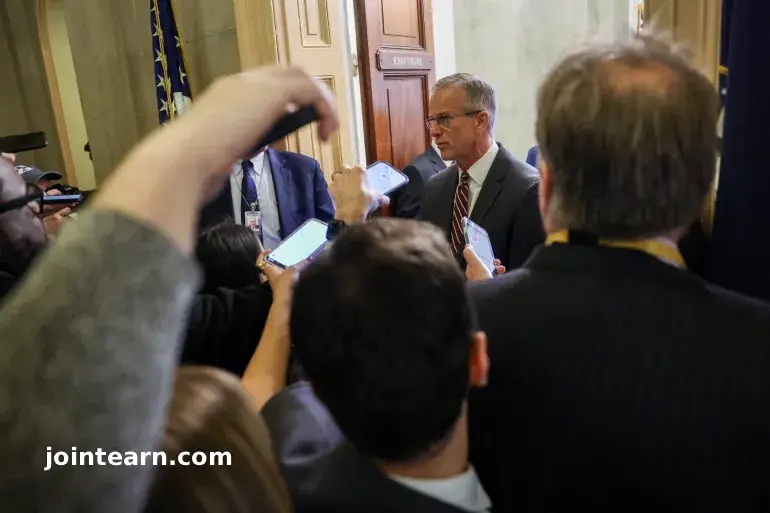
President Donald Trump has reignited the debate over the United States Senate filibuster, urging Republican senators to abolish the procedural rule to reopen the federal government. However, senior Republican leaders quickly rejected Trump’s proposal, emphasizing the filibuster’s importance as a foundational legislative safeguard.
What Is the Senate Filibuster?
The filibuster is a long-standing Senate rule that allows the minority party to block legislation unless 60 senators vote in favor. This procedural tool ensures that major legislative changes cannot pass without a broad consensus, giving minority parties a significant check on the majority.
Currently, the U.S. Senate is narrowly divided, with Republicans holding 53 seats and Democrats controlling 47. This split has allowed Democrats to leverage the filibuster to maintain certain government shutdown measures while pressing for extended healthcare subsidies.
Trump’s Call to Scrap the Filibuster
In a late-night social media post on Thursday, Trump urged Senate Republicans to consider the “nuclear option,” effectively eliminating the filibuster. He framed the move as essential to ending the 31-day government shutdown, one of the longest in U.S. history.
Trump’s sudden intervention has heightened tensions in Washington. Lawmakers now face a choice: either engage in bipartisan compromise or risk further political gridlock.
Republican Leaders Reject Trump’s Proposal
Despite Trump’s high-profile demand, Republican leadership firmly opposed any changes to the filibuster. Senate Majority Leader John Thune reiterated that the Senate’s rules remain unchanged. Thune emphasized that the filibuster is crucial for preserving the integrity of the Senate and providing Republicans with a strategic tool when in the minority.
A spokesperson for Thune, Ryan Wrasse, stated:
“The position on the importance of the legislative filibuster is unchanged.”
Similarly, Wyoming Senator John Barrasso, the Senate’s second-ranking Republican, confirmed that he also opposes altering the filibuster. Former Senate Majority Leader Mitch McConnell, who resisted Trump’s filibuster demands during his first presidential term, continues to stand firm.
Even House Speaker Mike Johnson defended the filibuster, acknowledging that while his chamber cannot change Senate rules, the safeguard has historically prevented unilateral legislative action.
The Political Impasse Over the Shutdown
The U.S. government shutdown has now extended over a month, affecting millions of Americans. Democrats are refusing to vote to reopen government operations without guarantees for extended healthcare subsidies, while Republicans insist that negotiations cannot proceed until government functions resume.
Senator John Curtis of Utah took to social media to oppose Trump’s proposal:
“The filibuster forces us to find common ground in the Senate. Power changes hands, but principles shouldn’t. I’m a firm no on eliminating it.”
Experts note that past attempts to eliminate the filibuster have often backfired politically. In previous years, when Democrats held full control in Washington, internal opposition prevented a filibuster repeal, illustrating its enduring role as a legislative safeguard.
Nationwide Impacts of the Shutdown
The ongoing shutdown has left tangible effects on Americans across the country. Federal programs, including SNAP food aid, are set to expire, leaving many families uncertain about access to essential services. Federal workers remain unpaid, flights face delays, and healthcare costs continue to climb.
Alaska Senator Lisa Murkowski highlighted the urgency of the crisis:
“People are stressing. We are well past time to have this behind us.”
While bipartisan talks continue behind closed doors, Trump has largely refrained from direct engagement with Democratic leaders, focusing instead on international visits.
Conclusion: Filibuster Debate Intensifies as Shutdown Persists
The debate over the filibuster is far from over. President Trump’s call to eliminate the Senate rule has reignited discussions about the balance of power in Congress and the effectiveness of procedural safeguards. Meanwhile, the government shutdown continues to disrupt everyday life for millions of Americans, emphasizing the urgent need for legislative compromise.
Whether the filibuster will remain a cornerstone of Senate procedure or face reform remains uncertain. For now, Republican leaders are united in preserving the rule, while the public watches the political standoff unfold.


Leave a Reply